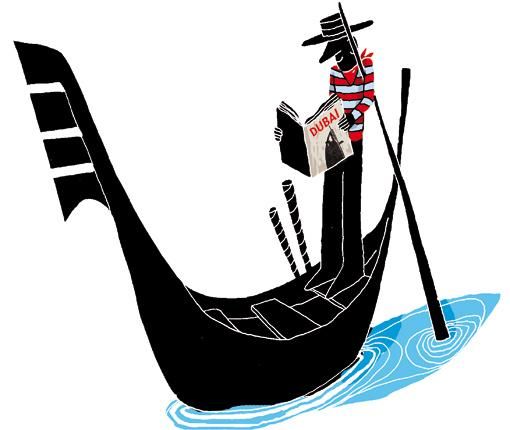I was in Venice for the first time this year. On my way out of the airport I thought of dukes and frescos, Shylock and Antonio, and masks and gondolas.
I walked the streets and took pleasure in the centimetre floods, I told myself though new to me, this is something rooted in old. I was a tourist but I was only right about the earlier. The only thing which is not true of Venice is that it is rooted in anything. The only thing which stood as a driver to Venice's success was that it was not rooted in anything; Venice was the most practical of cities that dreamed to be a principality.
Venice's strength and independence grew as the Byzantine empire's power waned towards the end of the ninth century. And so for the next three centuries the city built upon its strategic location on the head of the Adriatic Sea and became a thriving centre for trade and commerce between east and west - especially the Islamic world and the Byzantine empire. By the 13th century Venice was the most affluent and prosperous city in Europe and its main families would build the most audacious buildings and commission the most famous artists; and about two centuries later with the German invention of the printing press, Venice would become the printing capital of the world and its own Aldus Manutius would invent the concept of the paperback.
With all this trade, culture and exchange one can only imagine how Italian the Venetians must have thought of themselves. If you would look at average Venetian attire at that time, it may very well look more similar to an Ottoman rather than a Roman. What is Venetian to us today must have been a mix of Venice and all its neighbours and trade partners. And so when its people today look at the falafel stand and say "this is not Venetian", it is ironic and shows lack of perspective and understanding of one's own history.
It is always anthropologically problematic to define one against the other; drawing lines can be as drawing knives. Who is to say an identity is ripe and may not take anymore? "No thanks, I have no space for dessert!" How dare you decide when you are only part of a never-ending meal?!
Venice may not be what it was; the trade routes are gone, frescos are no longer commissioned and its fearsome navy is a relic of the past. Yet the legacy of co-existence, absorbing different cultures and global tolerance is what the city must not lose.
So who cares about the hegemony of Venetian social culture? Dubai does& or rather should learn from it. Dubai today may not have the exclusive status that Venice once enjoyed but it also doesn't suffer the envy that Venice's European and Mediterranean neighbours felt for it. This is for obvious reasons which - in short - are Dubai's ongoing role which it plays as a neutral hub, an opportunity provider, as well as continuing to offer others the opportunity to replicate several facets of its model in a manner that is suitable for them.
However, what Dubai, and when I say that I do not necessarily mean the government, Dubai Inc, or any other group but rather the city itself with all its inhabitants - and possibly external stakeholders, must refrain from doing is define itself by who it is today.
While the global recession has begun to sway some nations into enacting protectionist policies this should not extend to static identities. Dubai has become what it has by its incredible capacity to continue performing osmosis and while its future commercial sustenance may not be of great cause of worry - its future relativity in a more holistic manner as a beacon of civility and development for the region and a new model for the world is very much at stake as long as we define the city as composed of the one and the other.
Venice's decline was slow and painful. It can be attributed to three reasons: first its unsuccessful attempt at Thessalonica against the Ottomans which led to the latter declaring war on Venice, a devastating plague that claimed one-third of its population and finally the discovery of alternative trade routes in the east and Portugal's establishment as the main intermediary of trade between Europe and the west, which led to a colonial race that Venice couldn't participate in.
Dubai never needed to militarily protect its commercial status as it was built on trust, openness and the long view. Plagues and other deadly diseases can be treated early on today - or vaccinated against altogether. And fortunately, or rather unfortunately for others, there are no more trade routes to be discovered.
Dubai's only great challenge is to maintain a culture of openness and continue to absorb new identities into its own as it has done over the last two centuries& in other words this means that we are able to absorb new versions of our shawarma stands into our culture.
- Mishaal Al Gergawi is an Emirati commentator on socio-economic and cultural affairs in the UAE.
Your comments
Mishaal Al Gergawi, how long have you been to Venice or have you studied about Venice City? For sure you have been to see the BIENNALE, have you had a time to visit any museum or very nice old part of the city? In case you still there let me know and I will guide you to visit nice place like the Arsenale.
Livinio
Dubai,UAE
Posted: July 19, 2009, 11:36












